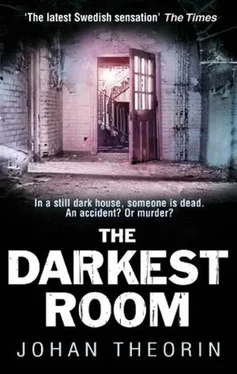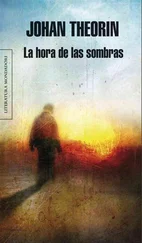“Stories?” Gerlof got up slowly and looked at her. “So now I’m designated as some kind of canny old man, sitting in a rocking chair with twinkling eyes telling tales of ghosts and superstitions?”
“It’ll be fine, Gerlof,” said Tilda. “Just look on yourself as a spiritual mentor. To someone who is grieving.”
“Oh yes? There’s no pleasure in grief, said the old man who sat weeping beside the wrong grave.”
Gerlof set off, leaning on his stick, and added, “We’ll just have to talk some sense into him.”
Tilda took his other arm. “Shall we take the wheelchair?”
“Not today,” said Gerlof. “My legs are working today.”
“Do we need to tell anyone we’re going?”
Gerlof snorted. “It’s nothing to do with them.”
It was Wednesday, the second week in December, and they were on their way out to Eel Point for coffee. Gerlof and the owner of the manor were to meet at last.
“How are things going at work, then?” asked Gerlof as they drove through the center of Marnäs.
“I only have one colleague at the station here in Marnäs,” said Tilda. “And he tends to keep out of the way… he’s usually down in Borgholm.”
“Why?”
Tilda remained silent for a few seconds.
“You tell me… but I happened to bump into Bengt Nyberg from Ölands-Posten yesterday, and he told me that the new police station in Marnäs already has a nickname.”
“Oh?”
“They call it the old women’s station.”
Gerlof shook his head wearily. “That’s what they used to call the train stations on the island that only had female staff in the old days. The male stationmasters didn’t think the women could do the job as well as them.”
“I’m sure they did it better,” said Tilda.
“Well, no one ever complained, as far as I know.”
Tilda drove out of Marnäs and down along the deserted road. The temperature was zero, and the flat coastal landscape seemed to have stiffened into a gray and white winter painting. Gerlof looked out through the windshield.
“It’s so beautiful here by the sea.”
“Yes,” said Tilda. “But you’re biased.”
“I love my island.”
“And you hate the mainland.”
“No, I don’t,” said Gerlof. “I’m not some narrow-minded local patriot… but love always begins at home. Those of us who live on the island have to preserve and defend the dignity of Öland.”
Gerlof’s sullen mood gradually lifted and he became more and more talkative. As they were passing the little churchyard in Rörby, he pointed toward the side of the road.
“Speaking of ghosts and superstitions… would you like to hear a story that my father told every Christmas?”
“Sure,” said Tilda.
“The father of your grandfather and my father was called Carl Davidsson,” Gerlof began. “He worked as a servant over in Rörby when he was a teenager, and he once saw a very strange thing here. His older brother had come to visit
him, and they were out walking here by the church in the twilight hour. It was around New Year, very cold and with plenty of snow. Then they heard a horse-drawn sleigh coming up behind them. His brother glanced over his shoulder, then cried out and grabbed hold of Carl’s arm. He pulled him down off the road and out into the snow. Carl didn’t understand what was going on until he saw the sleigh, which was coming closer along the road.”
“I know this story,” said Tilda. “My father used to tell it.”
But Gerlof carried on, as if he hadn’t heard her:
“It was a load of hay. The smallest load of hay Carl had ever seen, and it was being pulled by four tiny horses. And up in the hay little men were clambering around. They were less than three feet tall.”
“Goblins,” said Tilda. “Weren’t they?”
“My father never used that word. He just said they were little people dressed in gray clothes and hats. Carl and his brother didn’t dare move, because the men didn’t look friendly. But the load drove past the boys without anything happening, and once it had passed the churchyard the horses turned off the road and disappeared out into the darkness on the alvar.” Gerlof nodded to himself. “My father swore it was a true story.”
“Didn’t your mother see goblins too?”
“Yes indeed, she saw a little gray man run straight out into the water when she was young… but that was in southern Öland.” Gerlof looked at Tilda. “You come from a family that has seen many remarkable things. Perhaps you’ve inherited the ability to see things?”
“I hope not,” said Tilda.
Five minutes later they had almost reached the turning for the manor, but Gerlof still wanted to take a break and stretch his legs. He pointed through the windshield to the grassy landscape on the other side of the stone wall.
“The peat bog has started to freeze. Shall we take a look?”
Tilda pulled up at the side of the road and helped Gerlof
out into the cold wind. A thin layer of shining ice covered the watery patches all over the bog.
“This is one of the few old peat bogs left on the island,” said Gerlof as he looked out over the stone wall. “Most of the others have been drained and have disappeared.”
Tilda followed his gaze and suddenly saw a movement out in the water, a black shiver between two thick tussocks of grass that made the film of ice quiver and crack.
“Are there fish in here?”
“Oh yes,” said Gerlof. “I’m sure there are a few old pike… and the eels make their way here in the spring, when the streams created by the melting ice run down into the Baltic.”
“So you can catch them?”
“You can, but nobody does. When I was little, I was told that the flesh of fish caught in the bog had a musty taste.”
“So where does the name come from, then- Offermossen , ‘the Sacrificial Bog’?”
“Sacrifices from the old days,” said Gerlof. “Archaeologists have found Roman gold and silver here, and the skeletons of hundreds of animals that had been thrown into the water-lots of horses.” He fell silent, then added: “And human bones.”
“Human sacrifices?”
Gerlof nodded. “Slaves, perhaps, or prisoners of war. I suppose some powerful person decided that was all they were good for. As far as I understand it, they were pushed down beneath the water with long poles while they were still alive… then the bodies just lay there until the archaeologists found them.” He gazed out over the water and went on: “Perhaps that’s why the eels still come up here, year after year. They probably remember the taste, I mean they like eating the flesh of-”
“Enough, Gerlof.”
Tilda stepped away from the stone wall and looked at him. He nodded.
“Okay, okay, I’m just rambling. Shall we get going?”
***
Once they had parked the car, Gerlof made his way slowly across the gravel, leaning on his stick and Tilda’s arm. She let go briefly to knock on the glass pane in the kitchen door.
Joakim Westin opened the door after the second knock.
“Welcome.”
His voice was quiet and he looked even more tired than the last time she’d seen him, Tilda thought. But he shook hands with her, even smiled, and his earlier anger over the mix-up with the names seemed to have disappeared.
“I’m very sorry about your loss,” said Gerlof.
Westin nodded. “Thank you.”
“I’m a widower myself.”
“Oh?”
“Yes, but it wasn’t the result of an accident, it was a long illness… my Ellen got diabetes, then heart problems.”
“Recently?”
“No, it was many years ago,” said Gerlof. “But of course it’s still hard sometimes. The memories are still strong.”
Читать дальше










